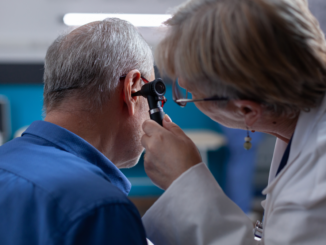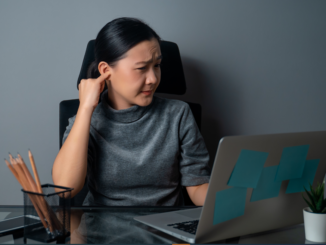
Crackling noise in the ear or ears is medically termed as tinnitus. This happen when the sound doesn’t come from an external source, but you seem to hear a constant crackling noise, buzzing sound, ringing, buzzing, blowing, howling, , hissing or whistling sound. This is what known as ‘ringing or crackling sounds in the ear’.
When you experience a crackling or buzzing noise in one or both ears, it may be harmless and easily go away. However, some causes of crackling noise in the ear require the individual to seek the services of either a primary care doctor or a specialist of the ear, nose, and throat.

Table of Contents
Causes of Crackling Noise in Ear
Individuals who either spend long hours using headphones on their ears or those frequently exposed to loud noise may find themselves experiencing a crackling noise in the ears. The crackling arises from the damage of the eardrum and its internal structures.
Moreover, bacterial and viral infections of an individual’s ears affect the sensation of hearing normally sometimes causing the crackling noise. Usually, this is accompanied by pain in the ear or ears affected and in some instances, the person’s hearing is also impaired.
Ear wax is a natural substance secreted by a gland in the skin of the outer ear to protect the ear canal from dust entering the ear. It also cleans, lubricates and resists the growth of bacteria inside our ears. When ear wax accumulates in your ear, however, it gets dry and forms a covering on the eardrum. The eardrum is an essential part of the ear responsible for sound conduction and when it is covered with ear wax, you may experience this anomaly as a crackling noise in the ear or ears affected.
Eustachian tube dysfunction can also cause crackling noise in ears.The Eustachian tube is a small tube connecting the ear with the back of the nose on one end and the upper part of the throat on the other end. It is responsible for circulating air in the middle ear and thus plays a major role in maintaining a balance between the internal and external air pressures of the nose.
Therefore, when a crackling noise in the ears is caused by this dysfunction, such individuals may also be suffering from an infection of their respiratory tract. This is because an infection of the respiratory tract causes too much fluid or mucus to build up in the nose. The buildup increases the nose’s internal pressure affecting the balance. As a result, when such an individual yawns or opens the mouth wide, he or she may experience a crackling noise in his or her ears. Allergic reactions also affect the ears in a similar manner to the respiratory tract infections.
Temporomandibular Joint Syndrome Disorder or TMJ is a dysfunction affecting the jaw and patients with this disorder may experience crackling noise in their ears. The temporomandibular joint and muscles of the jaw control the mouth’s movements whenever we eat, talk or breathe. When this joint is injured or does not work properly for some reason, the individual is said to have TMJ. Such a person is also likely to be a victim of crackling noise in either one or both of his or her ears especially during actions that move the jaw, for example, eating. This disorder is often characterized with severe pain in the jaw and is thought to be caused by jaw injury and arthritis among other suspects.
Sensory hair cells in the cochlea can be hurt or gradually reduce in volume when one is aging. In either case, it affects the conduction of sound signals to the brain. Consequently, the way sound is perceived changes and sometimes individuals whose sensory hair are affected perceive sound as a crackling noise in their ear or ears. In severe cases, hearing loss may ensue.
Foreign body entering the ear can reach the eardrum and cause irritation, therefore, affecting its function. For example, an insect enters the ear canal and rubs the eardrum as it gets trapped or moves. If this happens to you, it may cause strange sounds including a crackling noise in your ears.
Some drugs and medications are ototoxic, meaning that they can damage the auditory nerve responsible for allowing us to hear. Such medications include; aspirin, high doses of Ibuprofen, some diuretic drugs, specific antibiotics, and nonsteroidal anti-inflammatory drugs or NSAIDS. In addition, they are known to cause uncomfortable noises such as popping and crackling sounds in the ears. This is especially on occasions where these drugs are used inappropriately and sometimes the users unexpectedly lose their hearing.
Diagnosis
Diagnosis of crackling noise in the ears is required to be done by a doctor if the problem persists. It involves the physician taking down your medical history including any medications or supplements you might be taking. He or she may also require a hearing test taken by an audiologist to help with the diagnosis. If the crackling sound is accompanied with ringing or other noises common to tinnitus, the patient may require CT or MRI scans in the diagnosis.
Home Remedies
In order to remedy this annoying and sometimes depressing noise in the ears, the cause must be identified. Treatment, therefore, depends on the cause of the noise.
Removing earwax is necessary if the wax is too thick and its natural elimination is not effective in removing it. In such situations, the wax has formed a thick coat clogging the ear or ears. There are several home remedies that help remove earwax. These are:
- Use warm, olive oil. It’s best to gently massage the area around the opening of your ear canal to get the oil to go in.For a period of five to eight minutes, stay on your side. When you get up, use a paper towel to remove any excess oil. Instead of olive oil, other solvents that can be used are mineral or baby oil, hydrogen peroxide, glycerin, and tea tree oil. In the instance where hydrogen peroxide is used, a concentration of three percent is recommended and two drops are enough. However, it may damage the eardrum if used frequently and thus one should avoid using it often.
- Fish oils can be used to stabilize the levels of wax in the ear to normal levels.
- Ear drops should only be used with the doctors prescription to help get rid of the ear wax.
- Warm water is also effective in removing ear wax and solving the problem of crackling noise in the ear. A syringe should be used to apply the warm water into the clogged ear. The ear is then drained after ten minutes. Care is required for this method of application and certain precautions taken to avoid damaging the ear. First, one should hold their head vertically and hold the outside of the ear. Secondly, they should tilt the head and gently pull up the lobe to straighten out the ear canal. Lastly, they should squeeze the syringe gently to apply the warm water with low pressure. For best results, this application should be repeated severally. The ear wax comes out with the draining water from the treated ear.
Treatment for Crackling Noise in Ears
Treating dysfunctions of the Eustachian involves using simple home remedies as well as taking prescribed drugs. For example, chewing gum, yawning, swallowing can help regulate the internal pressure and stop crackling noise in the ear. Medication for the respiratory tract infection or allergic reaction, for example, decongestants and antihistamines should also be used where appropriate. Other drugs that help when prescribed are antibiotics, nasal spray and those used for nasal douching.
Treating the bacterial or viral infection affecting the ear can be done to alleviate the crackling noise in the ear under the direction of the doctor. Antibiotics and painkillers should also be used as prescribed by a doctor. Some home remedies used to treat ear infections include extracts of garlic and onions, olive oil, saline solutions, tea tree oil, apple and cider juices, basil, vinegar among others.
Temporomandibular joint syndrome should be treated in order to resolve crackling noise in the ear. Treatments of the condition include acupuncture conducted by a professional to relieve the symptoms. Pain relievers, anti-inflammatories muscle relaxants, and Tricycling antidepressants are also known to reduce the pain associated with this disorder. In addition to therapies like; use of oral splints or mouth guards, and physical therapy methods.
Valsalva Maneuver is a simple technique to clear ear noises such as popping and crackling. In this technique, you should pinch the nostrils while keeping the mouth closed. Breathe in deeply through your mouth and gently blow the air out through the nose. If you hear a slight popping sound upon releasing the air, it indicates the Eustachian tube is open again, therefore, resolving the crackling noise in the ear. Care should be taken to prevent damage of the eardrum because of using excessive force when blowing out the air.
Steam is commonly used to remedy sinus congestion and relieve the symptoms in clogged ears. This helps relieve crackling noise in the ear if the congestion is the cause for the noise. However, it should be done cautiously to prevent burning.
Tinnitus Retraining Therapy or TRT is used in cases to help the patient learn to live with the noise without getting disturbed or anxious about it. It should be done by professional counselors and requires regular practice to provide the relief sought from the noise.
Adopting healthy lifestyles like regular cleaning of the ears and reducing stress levels also help in relieving crackling noise in the ear.
Authoritative Clinical References
Audible popping sounds from inner ear – https://pubmed.ncbi.nlm.nih.gov/7620205/






Be the first to comment